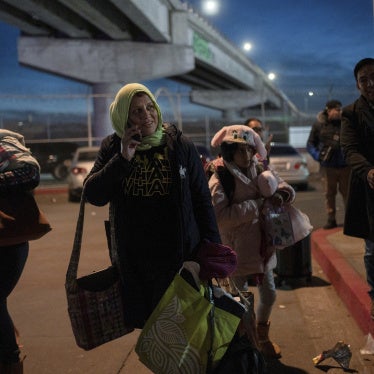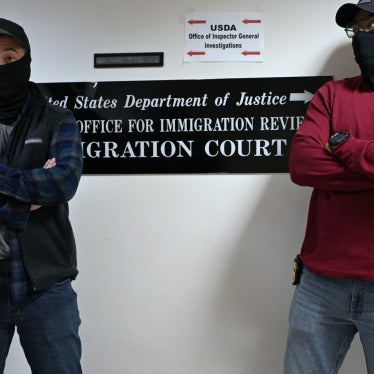By Jo Becker, Director of Children's Rights Advocacy for Human Rights Watch
Published in Miami Herald
Since arriving in the United States, 6-year-old Elian Gonzalez has been showered with attention, toys and trips to Disney World and Universal Studios. But for thousands of other children who, like Elian, arrive in the United States without their parents, the reception they receive is anything but warm.
But for thousands of other children who, like Elian, arrive in the United States without their parents, the reception they receive is anything but warm. In Portland, Ore., last year, six Chinese children were held for eight months in a juvenile-detention center together with violent youthful offenders. One of the group -- a 15-year-old girl -- was held for several weeks after being granted asylum, even though she had an uncle in New York ready to care for her.
She told a reporter: "I never thought I'd end up in a jail like this.''
Every year, some 5,000 unaccompanied minors are detained by the U.S. Immigration and Naturalization Service. Some children come to this country seeking asylum, others hope to be reunified with family members already here, many are simply seeking a better life for themselves and their families. Ultimately, many are deported or voluntarily return to their countries of origin.
Bewildered and frightened, these children often are kept in jail-like settings while their cases are pending. Human Rights Watch has investigated conditions for children detained by the INS in Arizona, California and Pennsylvania. We've found that such children frequently and systematically are denied fundamental human rights.
"Xiao Ling'' was one detainee interviewed during our investigation. She was detained at age 15. Though charged with no crime, she was sent to a secure detention facility in Pennsylvania, where she was housed with children accused of murder, rape and drug trafficking. She was assigned a small concrete cell, bare except for bedding and a Bible in a language that she could not read. She was forbidden to wear her own clothes or keep any personal possessions -- jewelry, hair ties, perfume, deodorant -- in her cell. She was forbidden to laugh or speak her native language.
Not surprisingly, Xiao Ling says that during her detention, she cried every day.
Although the average length of detention is 30 days, it is not uncommon for children to be held for six months or more. Cut off from their family and community, these children may become depressed or even suicidal. This isolation is compounded by a lack of staff with appropriate language skills. This leaves children who can't speak English unable to communicate even basic needs, or subject to disciplinary sanctions when they are unable to follow directions that they don't understand.
Children detained by the INS often have great difficulty obtaining information on their legal rights and access to meaningful legal representation. Most children depend on pro bono representation, but few attorneys are willing to take their cases, and those who do often are unwilling to give the case much time and attention.
International law states that children should be detained only as a measure of last resort, and only for the shortest possible length of time. Instead of being held in juvenile- detention centers, these children should be placed with foster families or in group homes.
INS: JAILER AND PROTECTOR Many of the problems encountered by children in INS detention stem from the INS's troubling conflict of interest: The children are arrested, imprisoned and frequently deported, all by the same agency that is charged with caring for them and protecting their legal rights. As a uniquely vulnerable population, children are entitled to receive care from child-welfare authorities who will act in the best interest of the child and are capable of protecting children's rights. The INS is not such an agency.
Elian Gonzalez faces an uncertain future. But while his fate is being determined, he is able to stay in a caring home, communicate in his own language and explore his environment. For many other children -- unnoticed and almost forgotten -- daily life is much bleaker.








